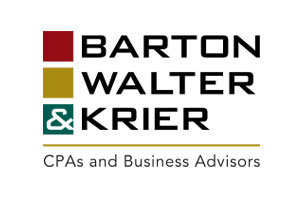Help Ensure Solid Financials
October 18, 2021 | Barton Walter and KrierWhen it comes to your financials, you want to make sure your bases are covered. And there’s a lot to consider. To make things easier, the premier accounting and tax specialists at Barton, Walter & Krier offer tips to help ensure solid financials.
Financial Framework
You got into business to do more than survive – you want to grow and be successful, right? Having a solid financial plan is key to all of this, and managing that plan is just as crucial. Taking charge of finances is at the base of everything you’re hoping to build, and we’re here to help with some of the basics for building a strong financial foundation.
Have a Plan
Your clear and detailed business plan will keep you focused on success. This plan should outline where you are now, where you want to be in the next couple of years, and how you intend to get there. What does the market look like? What kind of competition will you have? Who will you need to help you?
Determine the capital you will need and how you’ll secure it – business loans, angel investors, bootstrapping, grants, etc. How do you plan to attract interest and potential investors? Consider short-and long-term business goals and objectives and note how you plan to achieve them or the tentative timeframe for doing so.
Watch the Numbers
With so many key aspects to your business’s budget, you’ll need to keep detailed records to know where you stand. Turn a watchful eye to things like:
- The ins and outs. Know your financial position. Be mindful of the company’s cash flow. An accounting software package like QuickBooks offers a host of financial tools to help you organize and manage costs and profitability. Once you understand what you need to operate on a daily basis – payroll, utilities, rent, and more – you’ll then know your business’s bottom line and what you shouldn’t dip below.
- Accounts. Along with the budget, monitor invoices to ensure they’re straightforward and specific. This way you’ll also know whether customers are paying as determined and on time. Delayed payments may cause problems for your business, so keeping tabs on monies owed can help you plan and troubleshoot along the way.
Reconcile Regular Statements
Reconciling financial statements on a regular basis – be it monthly or quarterly – can help determine where you stand financially. You will also see if there are areas of concern of items with which to follow up.
Balance Sheet. A balance sheet shows things like your assets, liabilities, total debt, and shareholder equity at a given time. These statements are usually prepared for set time periods, such as quarterly or annually, and shows the business’s current financial status. As its name suggests, this document should always “balance,” meaning the assets should match up with any liabilities plus equity.
Income Statement. An income statement shows the business’s income and expenses. It also indicates whether you’ve made a profit or incurred a loss for a given time. This information is relevant for analyzing the effectiveness of strategies and ideas to increase earnings. Additionally, an income statement will help you understand the financial health of your business while helping investors determine profitability.
Cash Flow Statement. This financial statement is an accumulation of information regarding cash flow. It includes details on cash receipts, cash payments, and the cash balance increase or decrease during a fixed time. The cash flow statement helps measure profitability and long-term outlook as well as the business’s ability to settle its expenses.
Mind the GAAP
Generally Accepted Accounting Principles (GAAP) are a set of standard concepts, extensive ideas, and common approaches that represent best practices for financial reporting at a given time. The objective is to have thorough, consistent, accurate, and comparable financial information for the business.
The 10 basic principles of GAAP include:
• Regularity: adhering to standard regulations
• Consistency: applying the same measures from one reporting period to the next
• Sincerity: providing fair and neutral reporting
• Permanence: using consistent methods to allow for comparison
• Non-compensation: reporting with complete clarity
• Prudence: applying only fact-based data
• Continuity: presuming the business will operate while assessing assets
• Periodicity: reporting information during the appropriate time periods
• Materiality: revealing all accounting and financial information
• Utmost good faith: parties shall remain honest throughout
The GAAP principles help maintain dependability and integrity across the financial market. Likewise, these reports help assess financial standing for investors and economic regulators and allow confident comparison of different companies.
Confront Obstacles
If you see or sense a financial issue with your business, address it and investigate as quickly as possible. Asking for professional help as soon as you know you might need it is the best way to avoid digging yourself in too deep. And resources are available, so reaching out when needed can help lessen the impact for you and your business.
We’ve Got You Covered
These are just some of the things you can do to help ensure solid financials. There are plenty of other steps you can take to build, maintain, and develop financial success. And the accounting and tax professionals at Barton, Walter & Krier can answer your questions or help you discover a plan for your future. To learn more about financial strategies, contact us today.

